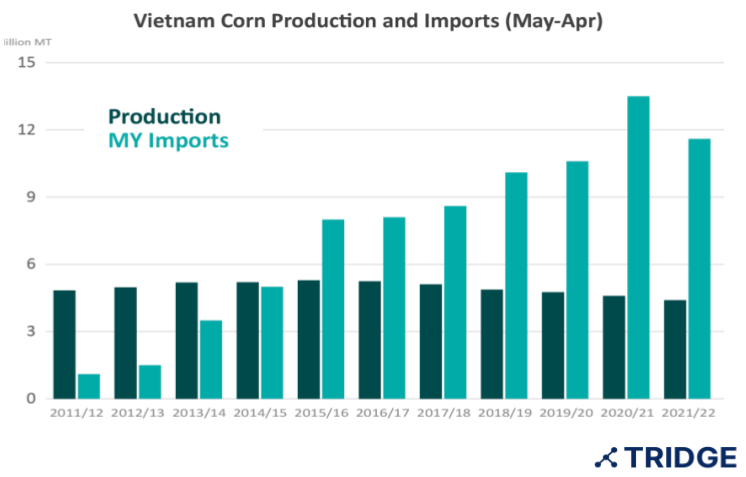Vietnam's Corn Imports Pick Up Pace but Future Outlook Uncertain
Poultry meat and eggs are a popular affordable source of animal protein to the Vietnamese people and it plays a vital role in the economy of many rural households. As Vietnam witnessedrapid growth and development there has been a rise in per capita income of the people further increasing animal-based protein consumption. Currently, Vietnam has a population of 385.5 million poultry animals which is likely to increase to 500 million in 2025. In order to feed the rapidly growing poultry population, Vietnam is heavily relying on import imports due to the limited production capacity in the country.
Domestic corn production in Vietnam gained momentum during the 1980s and continued increasing in 2015 while the imports remained plateaued. However post 2015, the corn imports started exceeding the production volume for the first time since the 1970s. The domestic corn production stalled and the volume declined as producers struggled to compete with high quality but lower prices corn from Argentina, Brazil, and Thailand. As of 2021, Vietnam is the largest importer of corn in Southeast Asia, and as per the predictions of USDA, it is to be the fifth-largest importer globally by the end of this year.

Source: USDA.
During the first eight months of 2021, Vietnam has already imported 5.7 million tons of corn which is 10% more than the volume imported at the same point of last year. The import volume is currently at an all-time high and it is the biggest import slate that Vietnam has ever handled. The country imported 48% of Vietnam’s estimated annual corn imports of 12 million tons estimated for 2021. The Vietnam feed industry continues to rely heavily on imported ingredients with approximately 70% of feed ingredients being imported. Import outlook for the upcoming season remains bleak due to low exportable supplies from a frost-damaged Brazil and drought-struck Northern America.
Furthermore, another wave of COVID - 19 is anticipated in Vietnam which will result in national lockdowns wrestling in limited demand, and logistics challenges to feed makers. The margins are expected to squeeze in the coming time for feed makers are the global corn prices remain robust with low meat prices. Fear of closure of feed mills is likely to decrease the pace of imports for corn, feed wheat, and other feed products. It is still hard to maintain a business as usual scenario in Vietnam as the fear of subsequent COVID-19 wave continues across the region.


